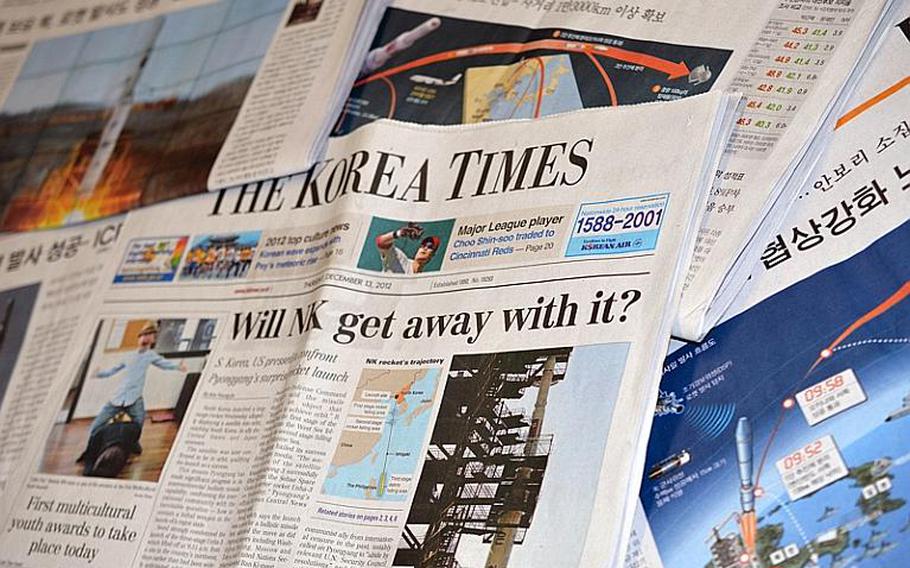Asia-Pacific
North Korea urges international community to ‘remain cool’
Stars and Stripes December 13, 2012

North Korea's rocket launch Dec. 12, 2012, dominated the front pages of South Korea's newspapers the following day. (Armando R. Limon/Stars and Stripes)
SEOUL — Faced with worldwide condemnation, the prospect of even-tighter United Nations sanctions and threats of possible retaliation for its purported satellite launch, North Korea is uncharacteristically urging everyone to “remain cool.”
“We hope that all countries concerned will use reason and remain cool so as to prevent the situation from developing [in an] undesirable direction,” a spokesman for the Foreign Ministry was quoted as saying on the government-run Korean Central News Agency website.
The spokesman insisted the North put a satellite into space Wednesday for “peaceful purposes,” but “hostile forces … are showing signs of [a] sinister bid to take issue with the launch.”
Criticism continued to mount from Seoul, Tokyo, Washington and U.N. headquarters in New York for a launch many believe was primarily designed to test the North’s ballistic missile capabilities, in violation of U.N. Security Council resolutions. The council issued a statement condemning the launch and saying it is formulating an “appropriate response.”
The three-stage rocket passed over Okinawa before the last stage splashed down east of the Philippines 16 minutes after launch. That was a significant improvement from last April’s failed launch, when the rocket broke up and exploded soon after takeoff.
Wednesday’s rocket traveled a distance that’s about a third of what the North would need to reach the continental U.S., long suspected to be its ultimate goal.However, experts say to achieve that goal, the North still has a number of technological hurdles, including better guidance systems and the ability to make a nuclear weapon small enough to fit in a warhead and sturdy enough to survive launch and re-entry.
North Korea is believed to be sharing missile and nuclear technology with Iran, although Tehran has denied it.
U.S. State Department spokeswoman Victoria Nuland said the launch was the latest example of how North Korea has spurned overtures from Washington to improve relations since Kim Jong Un took power in the reclusive communist country after the death a year ago of his father, Kim Jong Il.
“This new leader has a choice,” she said. “He can plot a way forward that ends the isolation, that brings relief and a different way of life and progress to his people, or he can further isolate them with steps like this.
“He can spend his time and his money shooting off missiles, or he can feed his people,” Nuland said. “But he can’t have both.”
After meeting with South Korean officials and U.S. Forces Korea commander Gen. James Thurman, Sung Kim — the U.S. ambassador to the South — issued a statement warning that violations of U.N. resolutions “have consequences.”
Kim said the U.S. will work with South Korea, Japan, Russia, China and others “to insist that North Korea live up to its commitments, adhere to its international obligations and deal peacefully with its neighbors.”
“North Korea’s use of its scarce resources for ballistic missiles and nuclear weapons programs does not enhance its national security or improve the well-being of its people,” he said. “Only by taking steps to join the international community by abiding by international norms will North Korea find what it seeks.”
The North Korean Foreign Ministry spokesman said it was “in line with the country’s scientific and technological development plan for the economic construction and improvement of people’s living standard.”
Yang Mu-jin, a political science professor at the University of North Korean Studies in Seoul, said the goal is long-term bargaining power, even if it means a short-term loss of badly needed aid in the perennially famished country.
“If North Korea really wanted to get the international community’s aid or support, it wouldn’t have launched the rocket,” he said.
Pyongyang appears to believe developing its missile and nuclear programs will eventually put it on equal footing with the U.S. and other countries at the bargaining table in the years ahead, he said.
Victor Cha, the Korea chair at the Center for Strategic and International Studies in Washington, said in a Web posting the U.S. would be wise to take a more serious look at the North’s emerging technology, rather than dismissing this launch, as it has previous missile-related efforts, “as yet another foolish attempt by the technologically backward and bizarre country.”
North Korean officials, he wrote, “still have other technological thresholds to cross (miniaturized warheads, reentry vehicle), but this was undeniably a major one.”
“The apparent success of this test makes North Korea one of the only non-allied countries ... to develop long-range missile technology that could potentially reach the United States,” Cha wrote.
Aside from working with the U.N. Security Council, he said, “the question is, will the United States do something else given the new strategic threat posed by the North, or will we wait for them to cross the next threshold to becoming a full-fledged nuclear threat to the U.S. homeland?”
rabiroffj@pstripes.osd.milrowlanda@pstripes.osd.milchang.yookyong@pstripes.osd.mil